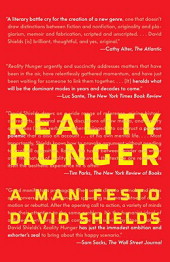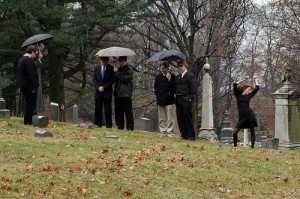The David Shields Interview (Paperback Edition)
 Flaubert claimed: “The value of a work of art can be measured by the harm spoken of it.” Reality Hunger, by David Shields, was one of the most controversial and talked-about books of 2010, reviewed nearly everywhere. Shields debated with journalists, writers, and artists such as Nicholson Baker, Simon Critchley, Leonard Lopate, John Cameron Mitchell, Rick Moody, Michael Silverblatt, Zadie Smith, DJ Spooky, Judith Thurman, and Simon Winchester. This past February saw the paperback release of Reality Hunger. Recently I met with Shields to analyze the polemics and decipher the carnage.
Flaubert claimed: “The value of a work of art can be measured by the harm spoken of it.” Reality Hunger, by David Shields, was one of the most controversial and talked-about books of 2010, reviewed nearly everywhere. Shields debated with journalists, writers, and artists such as Nicholson Baker, Simon Critchley, Leonard Lopate, John Cameron Mitchell, Rick Moody, Michael Silverblatt, Zadie Smith, DJ Spooky, Judith Thurman, and Simon Winchester. This past February saw the paperback release of Reality Hunger. Recently I met with Shields to analyze the polemics and decipher the carnage.
CALEB POWELL: The constructive response to Reality Hunger drowned, at times, amidst negative reviews. Walter Kirn said that he was “amused to see some of the hysterical reactions it’s provoked.”
DAVID SHIELDS: About negative reviews, the book is called a manifesto. It’s raison d’etre is to generate discussion. To provoke. I cannot object to any fiercely critical review. One reviewer said, “The discussion surrounding the book is more interesting than the book itself.” Well, what generated the discussion? My book.
CP: In their reviews…James Woods defended the traditional novel, and Michiko Kakutuni attacked.
DS: Neither of them talked about the book, they just mention it in passing. They are total spear carriers for conventional fiction…neither remotely engage with the argument. They mulch in a kind of drive by…Woods said something like…it’s good to be reminded of these arguments but Shields needs to define his terms better. Michiko called it “deeply nihilistic,” that’s so…
CP: It’s not the sharpest comment…it reads as hyperbole. I mean, you say the novel is worthless, but you praise a lot of art.
DS: She…and Woods, they are the megaphones of conventional fiction. The New York Times and The New Yorker, highly venerable institutions, whatever…they articulate nineteenth century conventional fiction…are you a Franzen fan?
Reality Hunger: A conversation

I enjoyed Reality Hunger. Blake, not so much. We had an email conversation about it. Here it is.
M: So, I gave you my galley of Reality Hunger, and saw this on your Twitter feed: “fairly underwhelmed by ‘reality hunger’ — what’s so innovative about making a list of things praising innovation?” I’m not sure that’s what I thought I was reading, though—a list of praise for innovation. I think I read an argument for the synthesizing of creative disciplines. Nonfiction and fiction, say, ingesting one another—two snakes swallowing one another whole, beginning at one another’s tail. And the thesis, antithesis, synthesis structure feels less linear to me than the word “list” implies.
B: You’re correct, it’s not quite just a list of praise for innovation–though quite a bit of the book repeats something along those lines of the ingesting as you mention, and does it again, again, again. And it’s certainly not untrue: fiction, or any writing, must continually evolve, for fear of that same pattern of repetition, or at the very least no longer being interesting, or “relevant,” which I think was Mr. Shields’s major point. People get bored. Times change. Sure. My problem with the book, though, is that, well, OF COURSE. Of course things will keep changing, and of course there will be those who feign against it, making more of the same, and that in the end leads to the demise of the interest, and the morph continues etc. These are things we know.
READ MORE >
May 21st, 2010 / 1:18 pm
Excited, but not to a Grave-Dancing degree
In ’08 when I got a galley of Reality Hunger, it was pretty clear that the book was going to rouse a little rabble when it came out. After I read it for a grad school class, I invited David to speak on a panel discussion I was putting together and I got to speak to him a little about the book and later did an interview. David also asked me to ferry a copy of the book out to the iceberg where Zadie Smith lives to hand a copy of the book to Zadie Smith, who was teaching at my university that year. I managed to get it the book into her hands, albeit blushing heavily. (I do admire her, despite suspecting her blood might run metallic and cold.) My bet was that she was going to enjoy the manifesto, though not necessarily agree with its every platitude.
When Zadie’s strange review in The Guardian came out, I was surprised to have been mentioned in it as the “excited American writing student,” and the implication that my peers and I are dancing on the grave of the novel. (I would link to the article but it’s not up on their site anymore. Here’s something I wrote about it a while ago.) In fact, Professor Smith, I am not dancing on the grave of anything, especially not the novel.
So after reading Zadie’s essay, Lincoln Michel’s really smart review on The Rumpus and Sam Anderson’s funny but annoyed review in New York Magazine, I feel like I need to say something in Reality Hunger’s defense. READ MORE >
March 18th, 2010 / 5:35 am

